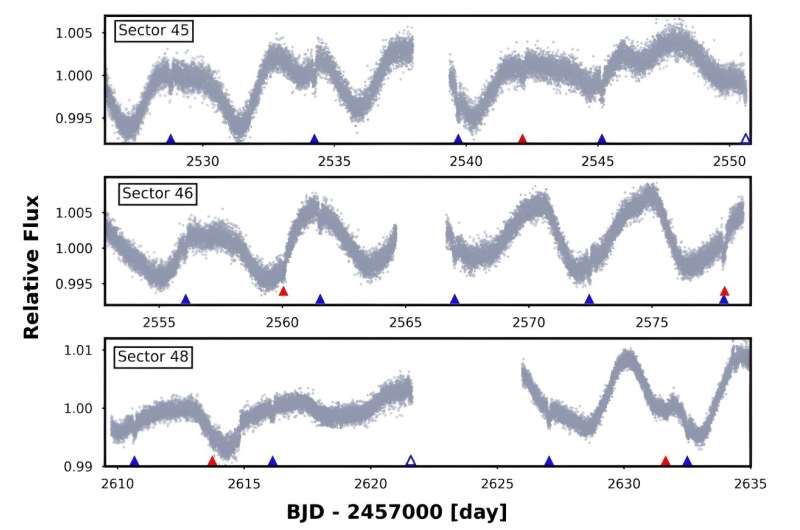October 23, 2023 report
This article has been reviewed according to Science X's editorial process and policies. Editors have highlighted the following attributes while ensuring the content's credibility:
fact-checked
preprint
trusted source
proofread
Two Neptune-sized exoplanets discovered with TESS

An international team of astronomers reports the detection of two new exoplanets orbiting a bright star known as TOI-5126, using NASA's Transiting Exoplanet Survey Satellite (TESS). The newfound alien worlds are similar in size to the solar system's outermost planet. The finding was published October 13 on the pre-print server arXiv.
To date, TESS has identified nearly 6,900 candidate exoplanets (TESS Objects of Interest, or TOI), of which 395 have been confirmed so far. Since its launch in April 2018, the spacecraft is conducting a survey of about 200,000 of the brightest stars near the sun with the aim of searching for transiting exoplanets.
Now, a group of astronomers led by Tyler R. Fairnington of the University of Southern Queensland in Toowoomba, Australia, has confirmed another two TOI candidates monitored by TESS. They detected transit signals in the light curve of TOI-5126—a bright F-dwarf star observed with TESS between November 2021 and February 2022. The planetary nature of these signals was confirmed by follow-up observations, using mainly ESA's CHaracterizing ExOplanets Satellite (CHEOPS).
"We report the discovery and validation of two planets around the bright F star TOI-5126," the researchers wrote in the paper.
The exoplanet closer to the star, designated TOI-5126 b, has a radius of about 4.74 Earth radii, what means that it is approximately 22% larger than Neptune. The planet orbits the host every 5.46 days, at a distance of some 0.065 AU from it. The equilibrium temperature of TOI-5126 b was estimated to be 1,442 K, hence the planet was classified by the authors of the paper as a hot super-Neptune.
The second planet reported in the study, TOI-5126 c, has an orbital period of about 17.9 days and is separated from the parent star by approximately 0.144 AU. The results indicate that TOI-5126 c has a radius of 3.86 Earth radii, and is therefore nearly the size of Neptune. The planet has an equilibrium temperature of 971 K and was classified as a warm Neptune.
The masses of the newfound alien worlds are yet to be determined. However, based on the mass-radius relationship models, the astronomers estimate that the predicted masses for TOI-5126 b and TOI-5126 c are 21 and 18 Earth masses, respectively.
When it comes to the host star TOI-5126, it is about 24% larger and more massive than the sun. The star is located some 525 light years away, has an effective temperature of 6,150 K, and is estimated to be 800 million years old.
In concluding remarks, the astronomers underlined that further investigation of the TOI-5126 planetary system could help us better understand the atmospheric composition difference between a hot super-Neptune and a warm Neptune.
More information: Tyler R. Fairnington et al, TOI-5126: A hot super-Neptune and warm Neptune pair discovered by TESS and CHEOPS, arXiv (2023). DOI: 10.48550/arxiv.2310.08890
Journal information: arXiv
© 2023 Science X Network




















